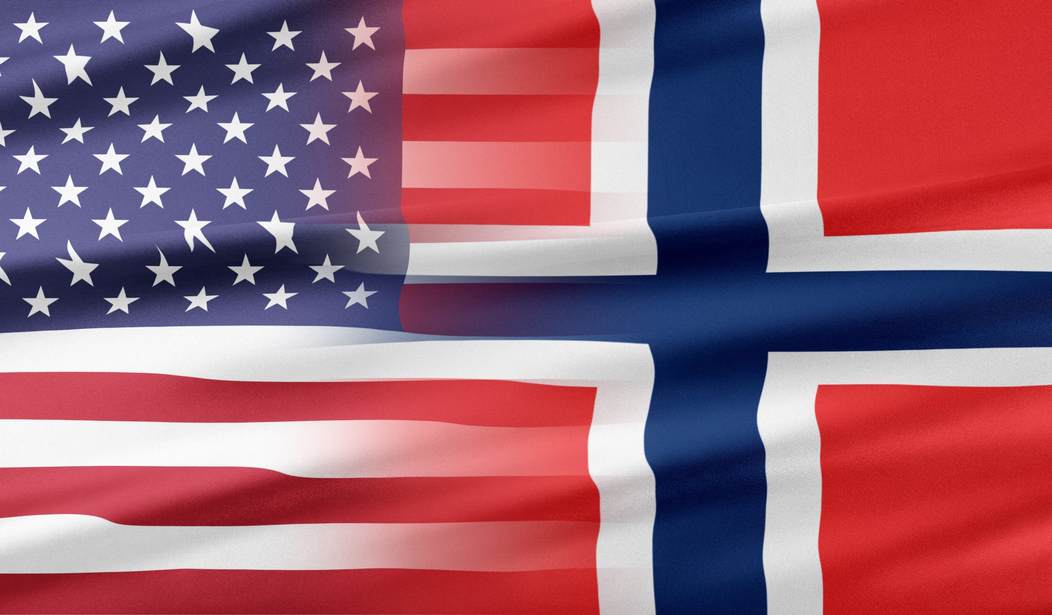Good news media are all alike; every bad news medium is bad in its own way. This is not to say that bad news media do not have certain attributes in common. In these days when the Western political and cultural establishment considers it de rigueur to avoid certain unpleasant truths, for example, bad news media tend to whitewash Islam, big time.
But there are different ways of approaching this task. Take Norway. With a couple of exceptions, all of the country’s major newspapers are mediocre, mendacious, and exceedingly Islam-friendly. The dignified look and traditional stylebook of Aftenposten, originally a Conservative Party organ, puts a bourgeois façade on its hard-left contents; opinion-heavy Dagbladet, founded as a Liberal Party sheet, wears its socialism – and its enthusiasm for Islam and mass immigration – on its sleeve; VG provides heavy doses of pop culture to make its left-wing politics go down more easily.
Worst of all is Dagsavisen, an anorexically slim sheet that used to be the Labor Party’s (and government’s) official gazette and that now survives only thanks to a hefty line item in the national budget. In 2016, Dagsavisen printed 20,440 copies a day and received $4.8 million from the state – a subsidy of $234 per reader. You’d think these people would be ashamed of themselves for ripping off taxpayers so flagrantly. On the contrary, this lame welfare queen of a daily exudes a staggering self-importance, posturing as the intellectual’s choice and presenting its shrill, predictable leftism as sophisticated and original.
Thank heaven, then, for the first-rate online alternatives to these rancid propaganda mills: Hans Rustad’s document.no, Human Rights Service’s rights.no, and the new kid on the block, resett.no, edited by Helge Lurås. In a country where a remarkable number of so-called professional journalists exhibit a breathtaking ignorance of history, economics, and general culture – not to mention a surprisingly poor command of their own language – Lurås is head and shoulders above the mob. At age 47, he has degrees in business, sociology, intellectual history, and social anthropology; he’s worked in the military, serving in Hungary and Guatemala and running an air base in Bosnia; he’s been an advisor at a foreign policy institute and founder of a center for strategic analysis; and he’s written a book called Who’s Threatening Norway Now?
Resett, founded last August, is a site worthy of a man with such a résumé. It’s a responsible reporter of news and it dispenses opinions, marked clearly as such, that challenge the orthodoxies of Norway’s mainstream media. It’s unapologetically pro-American and pro-Israel, fair to Trump, critical of Islam, and opposed to mass immigration. While the mainstream media are little more than megaphones for the political class, Resett takes on both of them. Needless to say, they don’t like it. They don’t like it at all. In Norway, as in the U.S., the established media were much happier when they had the game to themselves and their carefully cultivated picture of the world was almost universally accepted without question.
Nonetheless, it came as a surprise the other day when Dagsavisen, in an editorial the likes of which I have rarely seen before, mounted a direct attack on Resett, calling it a “radical-right website,” denying that it could be fairly called a “news medium,” and putting the word “editor” in scare quotes in front of Lurås’s name. Curiously enough, this brutal salvo was motivated, at least in part, by Lurås’s statement that he wished to run his website in accordance with the set of ethical rules to which mainstream Norwegian news operations have voluntarily agreed to conform, and to allow the Norwegian Press Association to render rulings against Resett when it decides he has violated those norms.
To Americans, it may seem curious for privately owned news organizations to get together, write up ethical rules, and appoint an independent body to enforce them. But that’s the way things work in Norway, and within this context Lurås’s desire to subject his site to those rules came off an act of goodwill and conscientiousness.
But the editors of Dagsavisen didn’t see it that way. They described Resett as a “fake news” outlet that doesn’t deserve to be mentioned in the same breath as “the serious, editor-run press.” They singled out for special condemnation a recent exposé by Resett of Liberal Party leader Trine Skei Grande’s 2008 tryst with a seventeen-year-old boy. And they closed by mentioning, as if it were worse than statutory rape, the fact that Resett is underwritten by certain billionaires. (It should be noted that in Norway’s more left-wing milieux – such as the government and media establishment – private financing of this sort is, by definition, tainted. Reputable enterprises, you see, don’t take money from the rich; they take it from the government.)
Replying to Dagsavisen, Lurås described its editorial as an “almost unbelievable” example of just how low some segments of the Norwegian press have sunk. He demanded that Dagsavisen supply “a single example of fake news” from Resett – and pointed out that their editorial, with its smears of Resett, was itself a specimen of “fake news.” As for Dagsavisen‘s defense of Skei Grande and its focus on Resett’s funding, Lurås noted that it’s none other than Skei Grande, in her role as culture minister, who holds the bag containing Dagsavisen‘s annual $4.8 million taxpayer handout – without which that rag would immediately go belly-up.
This sort of conflict of interest is par for the course in Norway’s small and incestuous cultural and political establishment, and it unquestionably keeps a good deal of significant news from ever seeing the light of day. Which, of course, is a big part of the reason why a website like Resett is so urgently needed, not only in Norway but throughout the Western world. And it’s why all such websites, wherever they’re introduced, can expect a reception from the established press that’s just like this one Resett has received – namely, one that’s utterly at odds with the spirit of professional respect, free inquiry, and simple honesty.









Join the conversation as a VIP Member